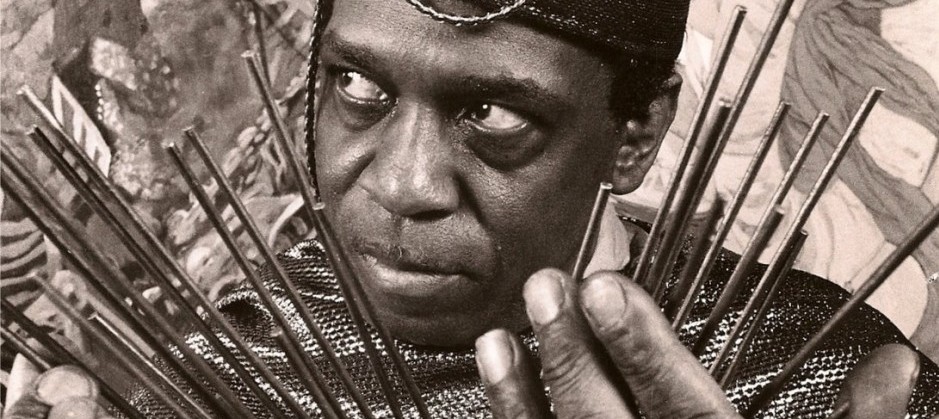
Dig That Crazy
Jazz
It's easy to judge someone as "sick in the head" from reading off
a list of a subject's eccentric behavior, but - as every good shrink knows -
you have to bear everything into account. Take jazz composer, and Prince Hall
Freemason, Sun Ra (born Herman Poole Blount, 1914 - 1993), who was diagnosed
by a psychiatrist as a schizophrenic when the musician's mythological theo-philosophy
was presented in jest. It wasn't until the good doctor looked into Sun Ra's
personal details that he noted no schizoid could organize their life, and as
many musicians as Ra had, in the orderly fashion done so far in his career.

It's odd that society
so easily marks anyone doing their own thing as a mental case, but here the
diagnosis couldn't have been further off the mark.
There are a few mentions in John Szwed's Space Is the Place: The Lives and
Times of Sun Ra, on how much the jazz legend trusted in the traditional
Africa belief that music could heal ills - especially of the mind. One story
told in example was of back when Ra still played under the simple name of "Sonny"
(mid-50s), and Blount's manager got him a gig inside a Chicago mental hospital.
The ward brought out some of their toughest cases (such as catatonics), as he
thrashed his keys, and tickled the ivories throughout the evening. It was said
that a woman - who had not spoken in several years - got up in the middle of
his set, and stood next to him at the piano. After a few minutes, she leaned
over, and almost screamed: "Do you call that music?"
Sun Ra often repeated that story, and - in commemoration of that interesting
event - later penned "Advice to Medics" on his 1956 LP Super-Sonic
Jazz.
Sun's interest
in mental health grew, and he later released Cosmic Tones for Mental Therapy;
an album he believed could bridge the gap between therapy and medication. Recorded
1963, and released in '67 under the band-name Sun Ra and His Myth Science Arkestra,
the record predated, and possibly inspired, psychedelia. Julian Cope wrote that
spinning the LP was as if "listening to a lost kraut/psych classic inspired
by [Syd Barrett and Tangerine Dream]."
The first track "And Otherness" opens with an unsettling drone, until
each musician blasts a cacophony of brass, but the trip really begins on "Thither
and Yon", which is a spacy jazz number full of reverb and echo.
Things get a little
weirder on "Adventure-Equation", though they level out to produce
a tribally funky jam by its end.
"Moon Dance" would probably be seen as the record's single, though
it is no hit by pop music standards. The organ, and bossa nova style, bring
to mind the lighter works of Ernie Freeman Combo, Billy May Trio or even Martin
Denny, until the track almost falls apart near closing out.
The album finishes
on "Voice of Space", which mirrors the roar, repetition, and reverberation
of "Thither and Yon", yet somehow sounds more surreal.
Well, what else, but all that, could anyone expect from someone whose motto
was "I use music as a medium to talk to people", and whose manager
was fond of repeating, "Music is the healing force of the universe"?
Sun Ra had no problems with being seen by the public as a senseless psychotic,
but never mentions - unlike his contemporaries in reggae (Lee Perry) and funk
(George Clinton) - that he was a madman. If anything, Sun Ra had more issues
with reality, than with insanity.
In his 1974 Afro-futurist sci-fi film, Space Is the Place, when asked
by a group of black youths if Sun Ra is "for real", he replies, "I'm
not real. I'm just like you. You don't exist in this society. If you did, your
people wouldn't be seeking equal rights. You're not real. We're both myths.
I do not come to you as reality. I come to you as a myth because that's what
black people are: myths."
Damn! The man may have been from Saturn, but he certainly wasn't nuts.
A. Souto, 2016
BACK TO MUSICA OBSCURA ARTICLE LIST